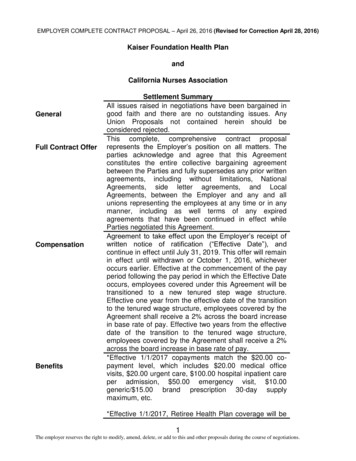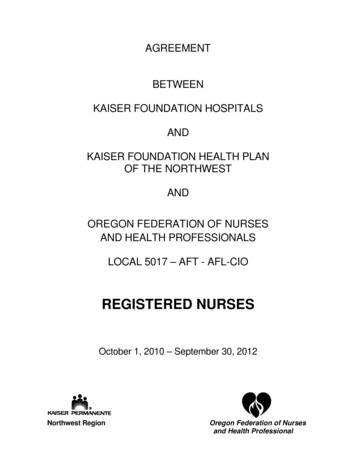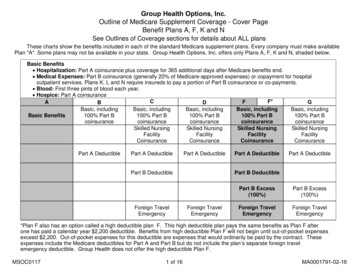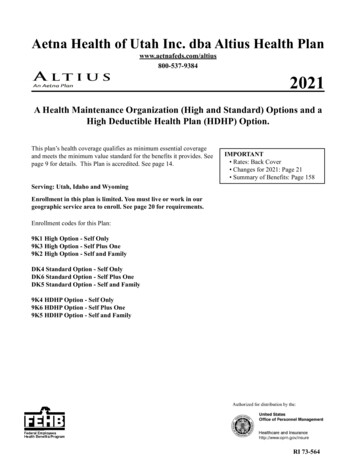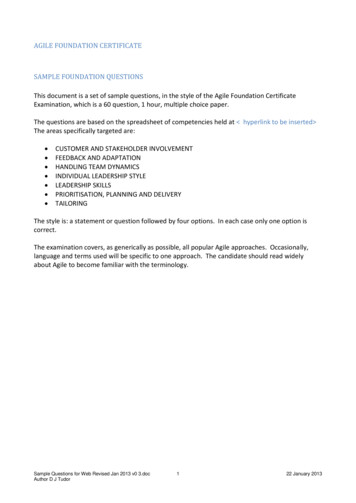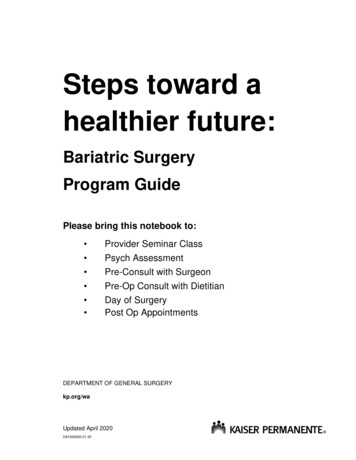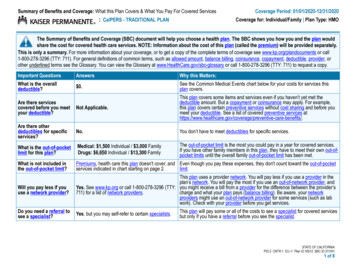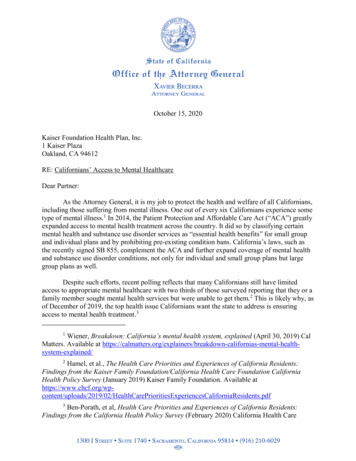
Transcription
October 15, 2020Kaiser Foundation Health Plan, Inc.1 Kaiser PlazaOakland, CA 94612RE: Californians’ Access to Mental HealthcareDear Partner:As the Attorney General, it is my job to protect the health and welfare of all Californians,including those suffering from mental illness. One out of every six Californians experience sometype of mental illness.1 In 2014, the Patient Protection and Affordable Care Act (“ACA”) greatlyexpanded access to mental health treatment across the country. It did so by classifying certainmental health and substance use disorder services as “essential health benefits” for small groupand individual plans and by prohibiting pre-existing condition bans. California’s laws, such asthe recently signed SB 855, complement the ACA and further expand coverage of mental healthand substance use disorder conditions, not only for individual and small group plans but largegroup plans as well.Despite such efforts, recent polling reflects that many Californians still have limitedaccess to appropriate mental healthcare with two thirds of those surveyed reporting that they or afamily member sought mental health services but were unable to get them.2 This is likely why, asof December of 2019, the top health issue Californians want the state to address is ensuringaccess to mental health treatment.31Wiener, Breakdown: California’s mental health system, explained (April 30, 2019) CalMatters. Available at rnias-mental-healthsystem-explained/2Hamel, et al., The Health Care Priorities and Experiences of California Residents:Findings from the Kaiser Family Foundation/California Health Care Foundation CaliforniaHealth Policy Survey (January 2019) Kaiser Family Foundation. Available pdf3Ben-Porath, et al, Health Care Priorities and Experiences of California Residents:Findings from the California Health Policy Survey (February 2020) California Health Care
Kaiser Foundation Health Plan, Inc.October 15, 2020Page 2The current COVID-19 pandemic only further amplifies the importance of access to andcoverage of mental health treatment. The virus and measures taken to address it haveexacerbated mental health conditions while also causing a reduction in access to services.4 It isthus more important than ever that we continue to remove whatever impediments exist tonecessary mental health care.Both California and the federal government have recognized the importance of mentalhealthcare and sought to address potential barriers through parity laws. Mental health paritylaws, including the California Mental Health Parity Act, the federal Mental Health Parity andAddiction Equity Act of 2008, and the ACA, which greatly expanded the 2008 law, generallyrequire insurers to provide coverage for medically necessary treatment of mental disorderswithout limitations or conditions more restrictive than those for medical illnesses. Despite suchparity laws, many Californians with insurance are exponentially more likely to go out of networkfor mental health treatment than they are for medical services.5 My office and I are committed toinvestigating and ensuring compliance with these laws to protect the mental health and wellbeingof all California residents.To further this goal, we are collecting information and documents to identify industry orindividual practices that may impede access to mental healthcare. This includes, for example,reimbursement rates for mental health providers, clinical guidelines used to determine medicalnecessity, provider network information, claim and preauthorization data, and provider contractsand credentialing requirements. Please provide the information and documents listed in“Attachment A” to the Attorney General’s office by November 16, 2020.Foundation p. 4. Available at survey/4Malapani, COVID-19 and the Need for Action of Mental Health (May 25, 2020)Columbia University Department of Psychiatry. Available -and-need-action-mental-health5Melek, Davenport, and Gray, Addiction and Mental Health vs. Physical Health:Widening Disparities in Network Use and Provider Reimbursement (November 19, 2019)Milliman Research Report, p. 38. Available athttp://assets.milliman.com/ektron/Addiction and mental health vs physical health Wideningdisparities in network use and provider reimbursement.pdf
Kaiser Foundation Health Plan, Inc.October 15, 2020Page 3Please contact Deputy Attorney General Martine D’Agostino atMartine.DAgostino@doj.ca.gov to coordinate. Thank you in advance for your cooperation.Sincerely,XAVIER BECERRAAttorney General
Kaiser Foundation Health Plan, Inc.October 15, 2020Page 4Attachment A1. Provide aggregate data regarding the number of approvals and denials (partial or full) forall preauthorization requests made at any time between January 1, 2018 to the present.This request is limited to fully insured commercial business. Separate the information bythe service, medication or equipment for which coverage is requested, procedure code(s)associated with the service, medication or item, and into groupings for either behavioralhealth or medical diagnosis. Also delineate the number of administrative denials versusthose for lack of medical necessity. Please use the following charts as an example:Preauthorization Requests for Behavioral Health DiagnosesService/Item for ProcedureNo.No.which Coverage Code(s) Approved DeniedRequestedDenial BasisAdmin.Lack ofMed. Nec.Preauthorization Requests for Medical DiagnosesService/Item for ProcedureNo.which Coverage Code(s) ApprovedRequestedDenial BasisAdmin.Lack ofMed. Nec.No.Denied2. Provide aggregate data regarding the number of claims paid or denied for all made at anytime between January 1, 2018 to the present. This request is limited to fully insuredcommercial business. Separate the information by the service, medication or equipmentfor which payment was requested, procedure code(s) associated with the service,medication or item, and into groupings for either behavioral health or medical diagnosis.Also delineate the number of administrative denials versus those for lack of medicalnecessity. Please use the following charts as an example:Claims for Behavioral Health DiagnosesService/Item for Procedure No. Paidwhich PaymentCode(s)RequestedNo.DeniedDenial BasisAdmin.Lack ofMed. Nec.
Kaiser Foundation Health Plan, Inc.October 15, 2020Page 5Claims for Medical DiagnosesService/Item for Procedurewhich PaymentCode(s)RequestedNo. PaidNo.DeniedDenial BasisAdmin.Lack ofMed. Nec.3. List the average contracted reimbursement rates and the average rates actually paid for(1) office visits and (2) evaluations, under fully insured commercial plans or policies,with the following specialists between January 1, 2018 to the present: Child and adolescent psychiatrists Respiratory therapists Geriatric psychiatrists Physician’s assistants Addiction psychiatrists Nurse practitioners Forensic psychiatrists Geriatricians General psychiatrists Neurologists Psychologists (Ph.d, PsyD, Ed.D) Pain management physicians Social workers Substance abuse counselor(CADC) Marriage and family therapists Psychiatric nurse practitioners Psychiatric nurses (PMHN) Applied behavioral analysisprovider Primary care physicians Occupational therapists Physical therapists Speech therapists4. Provide exemplars of each contract into which any healthcare practitioner has entered tobecome an in-network provider for fully insured commercial plans or policies that wascreated or in effect any time between January 1, 2018 and the present. This request doesnot include contracts with facilities but does include contracts with medical groups.5. Provide templates used for contracts through which all different types of healthcarefacilities have become an in-network provider for fully insured commercial plans orpolicies that was created or in effect any time between January 1, 2018 and the present.6. Provide all contracts with any entities to which utilization management of mental healthand substance abuse services and/or medication was delegated, such as to any mental
Kaiser Foundation Health Plan, Inc.October 15, 2020Page 6health service administrators, for fully insured commercial plans or policies and whichwere created or in effect at any time between January 1, 2018 and the present.7. Provide a description of the credential requirements which each specialty type of mentalhealth and/or substance abuse treatment practitioner must meet before they can contractto be an in-network provider for fully insured commercial plans or policies and whichwere created or in effect at any time between January 1, 2018 to the present.8. Provide a description of the credential requirements which each specialty type of medicaltreatment practitioner must meet before they can contract to be an in-network providerfor fully insured commercial plans or policies and which were created or in effect at anytime between January 1, 2018 to the present.9. Provide a description of all processes in place to assure accuracy of network providerinformation available to insureds or health plan members of fully insured commercialplans or policies, including accuracy of in-network status, provider contact information,and provider availability for new patients.10. Provide all documents created at any time between January 1, 2018 and the present whichreflect the results of any audit or investigation into the accuracy of network providerdirectory information.11. Provide all policies governing what actions are taken when consumers in fully insuredcommercial plans or policies complain of inaccurate provider network information. Thisincludes training materials, written procedures, and workflows.12. Provide a description of all oversight and audit measures of any entity to whichutilization management of mental health and substance abuse services and/or medicationhas been delegated for fully insured commercial plans or policies, such as any mentalhealth service administrators.13. Provide all policies relating to all oversight and audit measures of any entity to whichutilization management of mental health and substance abuse services and/or medicationhas been delegated, such as any mental health service administrators.14. Provide a description of all efforts currently taken to assure compliance with nonquantitative treatment limitation parity requirements.15. Provide a description of all efforts currently taken to assure compliance with quantitativetreatment limitation parity requirements.16. Provide a list of all of the specialists or facilities with whom a letter of agreement orsingle case use agreement was entered for the provision of a mental healthcare orsubstance abuse service to a fully insured commercial plan or policy member at any time
Kaiser Foundation Health Plan, Inc.October 15, 2020Page 7between January 1, 2018 and the present, with corresponding description of the serviceseach contracted to provide and the city in which they practice or operate.17. Provide all utilization management clinical criteria for fully insured commercial plansand policies, including those used internally or by any entity to which any utilizationmanagement has been delegated, separated by those for medical versus those for mentalhealth and substance abuse treatment. Provide both, current versions of these documentsand any substantively different versions that will be in effect in 2021.18. Provide a list of all medical services for which preauthorization is currently required byname and associated procedure code(s). This request is limited to fully insuredcommercial plans and policies. Please see the following example:Name of Medical Service forwhich Preauthorization isrequiredAssociatedProcedureCode(s)19. Provide a list of all mental health and substantive abuse services for whichpreauthorization is currently required by name and associated procedure code(s). Thisrequest is limited to fully insured commercial plans and policies. Please see the followingexample:Name of Mental HealthService for whichPreauthorization is requiredAssociatedProcedureCode(s)20. Provide a list of all medical services for which concurrent reviews are currently requiredby name and associated procedure code(s). This request is limited to fully insuredcommercial plans and policies. Please see the following example:
Kaiser Foundation Health Plan, Inc.October 15, 2020Page 8Name of Medical Service forwhich concurrent review isrequiredAssociatedProcedureCode(s)21. Provide a list of all mental health and substantive abuse services for which concurrentreviews are currently required by name and associated procedure code(s). This request islimited to fully insured commercial plans and policies. Please see the following example:Name of Mental HealthService for whichPreauthorization is requiredAssociatedProcedureCode(s)22. Provide the number of denials of in-patient mental health treatment coverage through aconcurrent review which occurred at any time between January 1, 2018 to the present,where the denied member or insured was subsequently admitted for in-patient mentalhealth treatment within 30 days of the denial, 60 days of the denial, and 90 days of thedenial. This request is limited to fully insured commercial health plans or policies.23. Describe the practices or data trends that can result in a deviation from standardutilization review policies and practices applied in a fully insured commercial health planor policy utilization review, regardless of whether the deviation from a standard policy isdone by a health plan directly or by a delegate entity.24. Provide the number of internal appeals made at any time between January 1, 2018 to thepresent, regarding a denial of coverage for a mental health o
15.10.2020 · Kaiser Foundation Health Plan, Inc. 1 Kaiser Plaza Oakland, CA 94612 RE: Californians’ Access to Mental Healthcare Dear Partner: As the Attorney General, it is my job to protect the health and welfare of all Californians, including those suffering from mental illness. One out of every six Californians experience some

